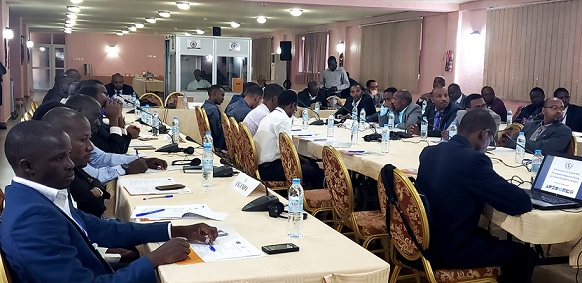
19 June 2019, (Entebbe Uganda): IGAD Security Sector Program (IGAD SSP), with support from the European Union Trust Fund (EUTF) through the Austrian Development Agency (ADA) under the IPPSHAR program, today opened a four days advanced regional training on “Criminal Intelligence Analysis” for all IGAD Member States.
Criminal intelligence is an essential instrument in preventing and countering transnational security threats like organized crime. It is the basis for proactive policing and investigation. The concept of intelligence led or problem-solving policing and crime control are entirely dependent on criminal intelligence capabilities. Capability in criminal intelligence analysis and methodology is necessary in our globalized and ever networking world to prevent and fight all serious and organized crime in particular, and transnational security threats in general. One of IGAD SSP’s key initiatives is to bridge the gaps to address these threats prioritized by IGAD Member States. The law enforcement capacity building component comprises of enhancing overall understanding and expertise skills of collecting, evaluating, analyzing, using and disseminating/sharing criminal intelligence information on the issues/problems that cause crimes, criminals and their networks among others. The IGAD wide training needs assessment of law enforcement agencies revealed that criminal intelligence analysis capability is a critical gap and considered by the majority of member states to take higher priority in regional training session. It is in line with this and in continuation of previous similar interventions that this advanced training has been organized.
The training was officially opened by Commander Abebe Muluneh, Director of IGAD Security Sector Program (IGAD SSP). Commander Abebe welcomed all the participants to the Pearl of Africa and expressed his appreciation to the Government of Uganda for hosting this important training. In his welcoming remark, he highlighted on the need to differentiate between information, data, and intelligence. He said that “Intelligence is data, information and knowledge that have been evaluated, analyzed, and presented in a decision-making format for action-oriented purposes….. Intelligence collection system produce data, not intelligence; only the human mind can provide that special touch that makes sense of data for different customer’s requirement. Intelligence is more than information; it is knowledge that has been specially prepared for user’s unique circumstances.” He further said that “criminal intelligence analysis is the identification and provision on insight into the relationship between crime data and other potentially relevant data with a view to law enforcement of judicial system practices”.
The overall objective of the training is to equip trainees with an advanced knowledge of criminal intelligence concepts, processes; and skills of implementing and applying analytical tools and techniques to strengthen the capacity of Member States’ law enforcement agencies to enable them effectively collect, collate, evaluate, analyze, use and disseminate criminal intelligence information. In addition, it aims to strengthen regional law enforcement cooperation and networking among the relevant officials. At the end of the training program, trainees are expected to
- Describe and discuss the definitions, processes and cycles of criminal intelligence;
- Apply the tools and techniques of criminal intelligence analysis, research tools and information sharing protocols;
- Understand and describe how intelligence can be used to mitigate risk; and
- Explore various case studies stated in the content of the training
About 35 representatives from all IGAD Member States drawn from relevant institutions such as the Police, Judiciary, Ministry of Foreign Affairs, Ministry of Justice, Financial Intelligence Units and National Counter Terrorism Centers are participating in this training. An expert from IGAD SSP and Mr. David Scott, a Scotland expert with over 23 year of experience on criminal intelligence analysis are expected to share their experiences and facilitate the training through interactive course materials, discussions, case studies, and group work exercises to bring about the required result of the training.
..ஜஜ۩END۩ஜஜ..
